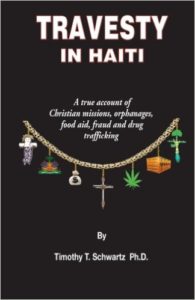This is the first part of a three part series about accountability in the NGO sector. Here I examine NGO accountability globally. In Part II, I trace the history of NGO accountability in Haiti. And in Part III, I provide recommended actions to increase accountability among NGOs in Haiti and make them more effective.
Anthropology of NGOs Part I: History of NGOs and Accountability

History of NGOs and Accountability
The massive emergence of NGOs endeavoring to alleviate world poverty, unfair government practices, abuse, and environmental degradation has been termed the ‘boom in civil society’ (SustainAbility 2003a:2), the rise of the “fifth estate” (Eizenstat 2004), a post WWII phenomenon equated in impact with the rise of the nation State (Salamon et al. 2003:6-7) But its viability is being threatened by waste and corruption and, more than anything else, a failure to do anything about it.
It is hard to imagine anyone agreeing that it would be a good idea to keep the accounting practices, pay, efficiency, and impact of NGOs a secret. Yet, in practice, this is exactly what most often occurs. In a University of Warwick survey of 600 NGO directors, most respondents gave no thought to their own accountability (Scholte, 2003); the Global Accountability Project (GAP) found that many NGO directors considered NGOs above accountability (GAP 2009); in a study of 300 Uganda NGOs Burger and Owens (2008) found that despite claims to the contrary, 69% of the NGOs did not consult the community before or after they initiated an activity and 25% of those who claimed to provide financial information on request did not do so or lied about it; in the Philippines, Abella and Dimalanta (2003) concluded their study of NGO accountability with the observation that many guard their financial information like they were “state secrets.”
Perhaps this secrecy is part of the reason for the second threat to the credibility of the NGO sector: they have failed to alleviate poverty. William Easterly (2006) calls it “the other tragedy of the world’s poor.” The original tragedy is the afflictions of hunger, treatable and preventable diseases, infant mortality, and unnecessarily high illiteracy rates. The other tragedy is the dollars wasted trying to address these problems; money stolen outright or lost to ineffective and mismanaged NGO programs. For example, credible estimates of aid money lost to corruption in Africa exceed 50 percent. But that is just part of the waste; the number of successful efficiently managed projects is, by anyone’s count, pathetically meager fraction of the total.
Whatever the reason for the cause of corruption and failed projects the solutions are obvious: accountability, transparency, and feedback. The fact is that in almost every developing country in the world NGO accountability is not yet a reality. With the exception of the sporadic monitoring and evaluation attached to State provided aid—most of which is self-monitoring and self-evaluation – one can count on the fingers of a single NGO director the serious efforts to regulate the 9 million NGO workers and 1.1 trillion dollars annually spent in the sector. A visit to the websites of these organizations reveals how painfully ineffective they have been.
- Credibility Alliance in India has 308 members out of the estimated 1.2 million NGOs in that country,
- Humanitarian Accountability Project (HAP), an agency seeking a voluntary system of accountability for the 40,000 international NGOs has, after 6 years of existence, a mere 36 members,
- Société Générale de Surveillance (SGS)–the world’s leading for-profit inspection, verification, testing and certification company–has, after 6 years of existence, certified a grand total of 68 of the world’s approximately 10 million NGOs,
- USAID funded ForeignAID Ratings, also in existence for 6 years, has certified a grand total of three NGOs,
- InterAction, in existence for five years and the most prominent international NGO regulatory agency,has a better but still discouraging record of 180 members,
The most obvious reason for the lack of success among the regulatory agencies is the fact that they are overwhelming self-regulatory, self-monitoring and even self-certifying (see Songco 2003:11-13 for a summary). When donors require stringent evaluation and monitoring regulations, the work is almost always in-house or conducted by “independent experts” paid for by the NGO in question.
It should go without saying that self anything is emphatically not accountability; and seeking approval from a consultant hired and paid by the organization that seeks the approval is a gross conflict of interest.
Another problem is that NGO leaders have reversed the logical order of the tasks that confront them. Rather than first tackling what Avina (1993) calls “short-term functional accountability” (‘accounting for resources, resource use and immediate impacts’), NGO regulatory agencies have skipped the basics and jumped straight to “strategic accountability” (‘impacts on the actions of other organizations and the wider environment’).
While coordination and long term planning are the obvious goals of everyone concerned with alleviating poverty, the consequence of skipping the basics is that, as seen, genuine cooperation has been half-hearted; meanwhile, no one even knows how many NGOs are out there: India, for example, might have one million (Credibility Alliance 2008) or maybe 1.2 million (India Guidestar 2009), or maybe five million (ibid). Russia may have 260,000 (Chicago Tribune 2008), or maybe 450,000 (Flounders 2006). Even Britain could have as many as 500,000 NGOs (Adair 1999); or maybe closer to the 170,000 that are registered (University of Kent 2008).
The very few developing country accreditation agencies—the only ones–include Pakistan Centre for Philanthropy (PCP) Certification Program. Begun in 2003, PCP has followed the course of those agencies mentioned above and rather than first focusing on “functional accountability,” focused instead on “long term strategic accountability.” And similar to those organizations, it has had limited impact: in six years of operation, the PCP has reviewed 194 of Pakistan’s estimated 8,000 to 16,000 registered NGOs.
Perhaps the only NGO that is based in a single developing country and focuses on accreditation of other NGOs, is the PCNC of the Philippines. Grounded firmly on mechanisms of functional accountability and given teeth by the Philippine government’s mandate that NGOs be accredited, PCNC has logged and certified 1,000 of that country’s NGOs. They have also reportedly brought the estimated number of organizations acting as NGOs in the Philippines down to 6,000–from estimates of 60,000 and even 249,000 to 497,000 (Songco 2003).
With perhaps the single exception of PCNC—which does focus on short term accountability–developed-world charity watch groups have had the greatest impact. The success of watch groups like Charity Navigator and the BBB dramatically illustrate the importance of focusing first on functional accountability. Watch groups have taken what should be seen as the first and critical evolutionary step in closing the feedback loop between NGO clients and donors by using financial data to evaluate soundness, organization, and probable sincerity. For example, GuideStar Nonprofit Compensation Report uses IRS data to report on the financial soundness of 99,827 NGOs; also using IRS data, Charity Navigator assesses the financial health of over 5,000 of the U.S.A.’s best-known charities; and the Better Business Bureau’s Wise Giving Alliance, arguably the most informative and effective of the watch groups (because it interviews NGO officers and provides a feedback mechanism through its online grievance and complaint service), lists information for 1,800 U.S. charities.
Sound good? Not so fast. Not a single one of these NGO watchdogs has any mechanism for actually verifying that what NGOs say are true, meaning that the projects they have on the ground are doing what they say they do or, for that matter, if the projects even exist. All they do is verify that the organizations exist, that they handle money, that they pay their staff and taxes. We have no idea if what they claim to do for beneficiaries is in any way true. In other words, the only assurance we have that anything is good is being done comes from the mouths of the same people we saw at the outset of this post who lie, embezzle, double dip, exaggerate and fail to report at absurd rates.
It bears repeating that the point is emphatically not that we should ignore “strategic accountability.” Planning, coordination, and monitoring improve the effectiveness of NGO programs and are, by anyone’s standards, the ultimate goal of a responsible NGO sector. But “functional accountability” is the first evolutionary step toward achieving “strategic accountability.” It involves first identifying the NGOs and then using accreditation and an online mechanism for complaints and feedback to expose those that are fake and predatory . Only then can funds be effectively channeled to responsible institutions; only then can we hope to develop effective methods of strategic accountability in partnership with other NGOs, donors, recipients, and the government sector; only then can we hope to effectively defend ourselves in the “war against NGOs;” and arguably, only then will an end to world poverty and environmental degradation become a reachable goal.
A quote from Owen Barder at Center for Global Development (2009) sums up the task at hand,
By investing in greater transparency and accountability of aid agencies, making more use of market and network mechanisms and closing the feedback loop we can change the context in which aid agencies operate and make faster progress on reducing poverty.
WORKS CITED
Abella, Carmencita T., and Ma. Amor L. Dimalanta. 2003. Philippines NGOs As Major Actors in Philippine Society. APPC Conference 2003 http://asianphilanthropy.org/APPC/APPC-conference-2003/12-country-study-2003.pdf
AccountAbility, “Reinventing Accountability for The 21st Century”. (Undated)
Adair, Anthony 1999. A Code of Conduct for NGOs: A Necessary Reform by http://www.moyak.com/papers/ngo-information.html
Alexander, V.D. 1998. Environmental Constraints and Organizational Strategies: Complexity, Conflict, and Coping in the Nonprofit Sector. In Powell, W.W. and Clemens, E.S. (eds.) Private Action and the Public Good. New Haven: Yale University Press.
Anheier et al., 2001. “Global Civil Society 2001”, World Congress of NGOs December 10th -13th 2009.http://www.wango.org/congress/about.aspx
Abella, Carmencita T., and Ma. Amor L. Dimalanta. 2003. Philippines NGOs As Major Actors in Philippine Society. APPC Conference 2003 http://asianphilanthropy.org/APPC/APPC-conference-2003/12-country-study-2003.pdf
AusAID http://www.ausaid.gov.au/makediff/default.cfm
Avina 1993
Bagci, Cahit 2003. Historical Evolution of NGOs: NGO Proliferation in the Post-Cold War Era The journal of Turkish Weekly (originally published in Avrupa Gunlugu in No 4/2003 pp. 299-326)
Bandow, Doug and Ian Vasquez 1994. “Perpetuating Poverty,” Perpetuating Poverty: The World Bank, the IMF, and the Developing World Edited by Doug Bandow and Ian Vasquez Cato Institute • 1994
Barder, Owen 2009. Beyond Planning: Markets and Networks for Better Aid Working Paper 185. Center for Global Development. October 2009.
Barr, A. and Fafchamps, M. 2004. A Client-Community Assessment of the NGO Sector in Uganda. Centre for the Study of African Economies Working Paper, Oxford University.
Barr, A. Fafchamps, M. and Owens, T. 2005. The Governance of Non-Governmental Organizations in Uganda. World Development, 33(4): 657-679.
Barr, A., Fafchamps, M. and Owens, T. 2003. Non-Governmental Organizations in Uganda. Draft report to the Government of Uganda, April 2003.
Blagescu, Casas and Lloyd, 2005
Bohnet, I. and Huck, S. 2004. Repetition and Reputation: Implications for Trust and Trustworthiness when Institutions Change. The American Economic Review, 94(2), Papers and Proceedings of the One Hundred Sixteenth Annual Meeting of the American Economic Association San Diego, CA, January 3-5, 2004, pp. 362-366.
Bolton, M. 2003. Setting the Record Straight. The Smart Company.
Bonbright, David and Srilatha Batliwala. 2007. Answering for Ourselves: Accountability for Citizen Organisations Annex 1: Citizen Sector Accountability – Initiatives and Papers and Annex 2-NGO Accountability: A Review of the Literature http://www.civicusassembly.org/default.asp?page= 155
BOND, “NGO Legitimacy – Voice or Vote?” in Global Policy Forum. February 2003.
Bonda, Penny 2009. The 21st Century NGO: Poised for Change? green@work magazine
Boston Globe Special 2006. Report: Exporting Faith, a four-Part series, October 8-11, 2006.
Botchway, K. 2001. Paradox of Empowerment: Reflections on a Case Study from Northern Ghana. World Development, 29(1): 133-153.
Bothwell, R., “Trends in Self-Regulation And Transparency Of Nonprofits In The U.S.,” in The International Journal of Not-for-Profit Law – Volume 2, Issue 3. July 20, 2004
Bovard, James 2005 Bush’s Foreign-Aid Fraud Posted October 24, 2005
Burall, S. and C. Neligan, “The Accountability of International Organizations”, GPPi Research Series No. 2, Global Public Policy Institute, Berlin, Germany. (Undated)
Burger, R. 2005. What we have learnt from post-1994 innovations in pro-poor service delivery in South Africa: a case study-based analysis. Development Southern Africa 22(4): 483-500.
Burger, Ronelle and Trudy Owens 2008. Promoting transparency in the NGO sector: Examining the availability and reliability of selfreported data. Centre for Research in Economic Development and International Trade, University of Nottingham Research Papers at www.nottingham.ac.uk/economics/credit/
Bush, George W. 2002. Commonwealth Club Address. April 30, 2002
Caucus of Development NGO Networks, “Project on Implementing the Code of Conduct for Development NGOs, Terminal Report”. 1997.
Chamberlain, R., “Regulating Civil Society: The Philippine Council for NGO Certification”, Philippine Council for NGO Certification.
Charles, Jaqueline 2009. Haiti at a crossroads as donations dry up and upheaval looms Miami Herald. Thursday, January 15, 2009
http://www.miamiherald.com/news/americas/haiti/v-fullstory/story/849297.html
Christensen, J. 2004. Asking Do-Gooders to Prove They Do Good, New York Times, 3 January 2004.
Chua, Y., “Thaksin’s fate unlikely to befall Arroyo,” in inq7.net.
http://newsinfo.inq7.net/breakingnews/nation/view_article.php?article_id=22521
Cohen, J., “Governance by and of NGOs”, AccountAbility. (Undated)
Commonwealth Business Council, 2003. “Strengthening Good Governance in Business, Government, & Civil Society: Shared Challenges of Leadership and Accountability”. November 2003.http://www.commonwealthclub.org/archive/02/02-04bush-speech.html
Constantino, David, K., 1997. “Intra-Civil Society Relations, An Overview,” in Civil Society Making Civil Society, in Ferrer, M. (ed.), Civil Society Making Civil Society, Third World Studies Center, University of the Philippines. Quezon City. 1997.
Credibility Alliance. http://www.credall.org.in/about_us/aboutus.htm
Credibility Alliance 2008. A monthly newsletter of Credibility Alliance News. Issue 27, December 2008.http://www.credall.org.in/newsletters/newsletter_dec08.pdf
Crowson, N, McKay, J, and Hilton, M. 2009. NGOs in Contemporary Britain: Non-State Actors in Society and Politics Since 1945: Palgrave MacMillan.
Dombrowski, K., 2006. “Working Paper: Overview of Accountability Initiatives,” Working Paper Number 100, One World Trust. January 2006.
Easterly. William 2006 The White Man’s Burden, Publisher Penguin Press. Year 2006
Economist , 1999. “The Non-Governmental Order: Will NGOs Democratize, or Merely Disrupt, Global Governance?,” in Global Policy Forum. December 11-17, 1999.
Economist, 2003. Living with the enemy. 7th August.
Edwards, M. and D. Hulme, 1996a. “Too Close For Comfort? The Impact of Official Aid on Nongovernmental Organizations,” in World Development, Volume 24. U. K. 1996.
Edwards, M. and Hulme, D. 1996b. NGO Performance and Accountability. In Beyond the Magic Bullet: NGO Performance and Accountability in the Post-Cold War World.West Hartford: Kumarian Press.
Edwards, M., 2003. “NGO Legitimacy – Voice or Vote?”, BOND, 2003.http://www.globalpolicy.org/ngos/credib/2003/0202rep.htm. (Accessed October 15, 2006)
Eizenstat, Stuart E. 2004. Nongovernmental Organizations as the Fifth Estate. Seton Hall Journal of Diplomacy and International Relations Volume 5, Number 2 Summer/Fall 2004
Entine, J., 2003. “Why “Progressives” Oppose NGO Transparency,” in Ethical Corporation Magazine. August 2003.
Estanislao, J., 2003. “Strengthening Democracy in the Philippines: Civil Society Solutions to Public Governance,” in Economic Reform Feature Service, Center for International Private Enterprise. December 15, 2003.
Ewards, Michael 2000. NGO Rights and Responsibilities: A New Deal for Global Governance, London: Foreign Policy Centre, 2000, p. 30.
Fama, E and Jensen, M. 1983. Agency Problems and Residual Claims. Journal of Law and Economics, 26: 327 – 350.
Farmer, Paul 2009. Interview by Mediahacker. October 4th 2009 (http://www.mediahacker.org/2009/10/interview-un-deputy-envoy-to-haiti-dr-paul-farmer/).
Florini, A. M. 1999. Does the Invisible Hand Need a Transparent Glove? The politics of transparency. Paper prepared for the Annual World Bank Conference on Development Economics, Washington, D.C., April 28-30, 1999.
Flounders, Sara 2006. U.S. finances opposition In Worker’s World
(Published Feb 6, 2006 9:32 PM)http://www.workers.org/2006/world/ngos-0216/
ForeignAID Ratings http://www.foreignaid.com/index.html
Freedman, M., 2000. “Financial Implications Affecting Nonprofit Nongovernmental Organizations Today,” in The International Journal of Not-for-Profit Law – Volume 2, Issue 3. 2000.
Gibelman, M. and Gelman, S. R. 2004. A Loss of Credibility: Patterns of Wrongdoing among Nongovernmental Organizations. Voluntas, 15(4): 355 – 381.
Gibelman, Margaret DSW, and Sheldon R. Gelman, Ph.D, Dorothy and David I. Schachne 2000. Very public scandals: an analysis of how and why nongovernmental organizations get in trouble a working Paper Yeshiva University Wurzweiler School of Social Work New York, NY Paper was presented at the International Society for Third-Sector Research (ISTR) Fourth International Conference, Dublin, Ireland, July 7, 2000.
Global Development Policy Forum, NGO Accountability. http://www.gdrc.org/ngo/accountability/index.html (Accessed May 26, 2006)
Global Development Research Center, NGO Codes of Conduct.http://www.gdrc.org/ngo/codes-conduct.html. (Accessed July 24, 2006)
Gneezy, U. 2005. Deception: The role of consequences. American Economic Review, 95(1): 384-394.
Hansmann, H. 1980. The Role of Nonprofit Enterprise. Yale Law Journal, 89: 835-901. Hörner, J. 2002. Reputation and Competition. The American Economic Review, 92(3): 644-663.
Hartnell, C., 2006. “The Philippines: Self-regulation on Trial,” in International Journal for Non-Profit Law. January 9, 2006.
Independent Sector, Accountability Overview 2006.http://www.independentsector.org/issues/accountability.html. (Accessed July 24, 2006)
India Guidestar http://guidestarindia.blogspot.com/2009/06/how-many-ngos-are-there-in-india.html
Jacobine, Kenn 2008. Foreign Aid. Now!Sunday, April 6, 2008http://www.nolanchart.com/article3388.html Transcript provided by kaisernetwork.org, a free service of the Kaiser Family Foundation1 http://www.kaisernetwork.org/health_cast/uploaded_files/041206_interaction_clinton_transcript.pdf
John Hopkins University, 1999. Center for Civil Society Studies: Global Civil Society – Dimensions of the Non-profit Sector, John Hopkins, Baltimore.
Jordan, L., 2005. “Mechanisms for NGO Accountability”, GPPi Research Paper Series No. 3, Global Public Policy Institute, Berlin, Germany.
Keystone, 2006. “Downward accountability to ‘beneficiaries’: NGO and donor perspectives”. June 2006.
Keystone, 2006. “The Keystone Method.” January 2006.
Keystone,2004. Accountability for Change, April 2004.
Kihato, C. and Kabemba, C. 2002. Enhancing policy implementation: Lessons from the
Education sector. Centre for Policy Studies Research report 92. Centre for Policy Studies: Johannesburg.
Knight, W. Andy, Martha Schweitz, Kaoru Kurusu, and John McLaughlin 1996. World NGO Conference: Report of the First Preparatory Meeting Held at UNU Headquarters, Tokyo, 23-24 September 1996
Laurent, Marguerite “Ezili Danto” 2009. (August 16) What U.N. Special Envoy Bill Clinton may do to help Haiti Haitian Lawyers Leadership Network
Leader, N., 1999. “Codes of Conduct: Who Needs Them?,” in Relief and Rehabilitation Network. Newsletter No. 13. March 1999
Lee, J., 2004. “NGO Accountability: Rights Responsibilities”, Center for Applied Studies in International Negotiations, Geneva, Switzerland. October 19, 2004.
Litovsky, A., 2006. “Accountability to intended beneficiaries: Yet another buzzword or a development imperative?”, powerpoint presentation to PCNC. October, 2006.
Lloyd, R. 2005. “The Role of NGO Self-Regulation in Increasing Stakeholder Accountability”, One World Trust. July 2005.
Lloyd, R. and L. de las Casas, 2006. “NGO Self-Regulation: Enforcing And Balancing Accountability”. One World Trust, London. August 11, 2006.
Lloyd, Robert 2008. Promoting Global Accountability: The Experiences of the Global Accountability Project Global Governance 14 (2008), 273-281
Mansuri, G. and Rao, V. 2004. Community-Based and -Driven Development: A Critical Review. World Bank Research Observer, 19(1): 1-39.
Maren, Michael, 1997. The Road to Hell: the ravaging effects of foreign aid and international charity. New York, NY: Free Press.
Marschall, M., 2002. “Legitimacy and Effectiveness: Civil Society Organizations’ Role in Good Governance,” in Global Policy Forum. November 1, 2002.http://www.globalpolicy.org/ngos/credib/2003/0529legit.htm
McGann, J. and Johnstone, M. 2006. The Power Shift and the NGO credibility crisis. The International Journal of Not-for-Profit Law, 8 (2): 65–77.
McGann, J. and M. Johnstone, 2006. “The Power Shift and the NGO Credibility Crisis,” in The International Journal of Not-for-Profit Law Volume 8, Issue 2. International Center for Not-for-Profit Law, Washington, DC. January 2006.
Michaelowa, K. and Borrmann, A. 2006. Evaluation Bias and Incentives Structures in Bi- and
Multilateral Aid Agencies. Review of Development Economics, 10(2): 313-329.
Mocan, H. N. and Tekin, E. 2000. Nonprofit sector and part-time work: An analysis of employer-employee matched data of child care workers. NBER Working Paper 7977.
Moore, Stephen 1997. “Foreign Aid: End It, Don’t Mend It,” by Stephen Moore, Investor’s Business Daily, March 17, 1997.
Morris , Debra 2006. Charitable fund-raising costs under scrutiny in the US Supreme Court – a UK perspective In Legal Studies. 24: 4 (599 – 620). Published Online: 27 Apr 2006
Munyemesha, Evans 2003. International Aid first published 20 October 2003 in The Zambian
Naidoo, K., 2000. “An overview of some of the factors driving the development of self-regulation frameworks for the NGO community across the world,” Prepared for the NGO Self-Regulation Workshops in Pakistan from 8 –12 August 2000.
Naidoo, K., 2003. “Civil Society Accountability: “Who Guards the Guardians?””, New York. April 3, 2003.
NGO Monitor Digest 2005 “EU Anti-Fraud Office to Investigate 32 NGOs”in NGO Monitor Digest 3: 11. July 04, 2005
Olken, B.A. 2005. Monitoring Corruption: Evidence from a field experiment in Indonesia.
National Bureau of Economics Research Working Paper 11753, November 2005.
One World Trust (http://newsletter.electricputty.co.uk/T/ViewEmail/r/2C4231BBBECAA6E2/FF375D0D1994B87E6A4D01E12DB8921D#accountability_in_practice)
Oxford Analytica, 2005. “Holding NGOs Accountable,” in Forbes. April 5, 2005.
Philippine Council for NGO Certification (PCNC) http://www.pcnc.com.ph/
Platteau, J-P and Gaspart, F. 2005. Disciplining Local Leaders in Community-based Development. Centre for Research on the Economics of Development Working Paper, July 2005.
PRIA- John Hopkins University study conducted in the year 2001
Rodriguez, Alex 2008. Hobbled NGOs wary of Medvedev Watchdogs are civil lifeline in lawless Russia
Chicago Tribune Wednesday, May 07, 2008
http://archives.chicagotribune.com/2008/may/07/news/chi-russia-civil_rodriguezmay07
Rose-Ackerman, S. 1999. Corruption and Government: Causes, Concerns and Reform. Cambridge: Cambridge University Press.
Ruhm, C. J. and Borkoski, C. 2000. Compensation in the Nonprofit Sector. NBER Working Paper 7562.
Salamon, L. and S. Geller, 2005. “Nonprofit Governance and Accountability”, Johns Hopkins University.
Salamon, L., W. Sokolowski and R. List, 2003. “Global Civil Society, An Overview”, The Johns Hopkins University, Baltimore, Maryland.
Savedoff, William D. and Ruth Levine. 2005. The Evaluation Agenda. December. Found in Researchgate.net.
Scholte, 2003
Schwartz, Timothy T. 2008. Travesty in Haiti Booksurge: Charleston S.C.
Shea, C. and S. Sitar, “NGO Accreditation and Certification: The Way Forward? An Evaluation of the Development Community’s Experience”, International Center for Not-for-Profit Law. Undated.
Shiras, Peter 2003. The new realities of non-profit accountability 1 December Alliance magazine
Shiras, Peter 2003. The new realities of non-profit accountability Alliance magazine. 1 December 2003
Sida. 2007. Fraud in foreign aid Does the Swedish International Development Co-operation Agency (Sida) ensure adequate control of foreign-aid operations conducted through nongovernmental organisations (NGOs)? To the Government Ministry for Foreign Affairs Date: 24 September 2007 Ref. No: 31-2005-1252
Sidel 2003 nn
Sidel, M., 2005 “Trends in Nonprofit Self-Regulation in the Asia Pacific Region: Initial Data on Initiatives, Experiments and Models in Seventeen Countries”, Asia Pacific Philanthropy Consortium.
Slim, H. 2002. “By What Authority? The Legitimacy and Accountability of Non-Governmental Organizations,” presentation to International Meeting on Global Trends and Human Rights — Before and After September 11, Geneva, January 10-12, 2002. The International Council on Human Rights Policy.
Slim, Hugo 2002. By What Authority? The Legitimacy and Accountability of Non-governmental Organisations Senior Lecturer Oxford Brookes University © 2002, International Council on Human Rights Policy
Sobel, J. 1985. A Theory of Credibility. The Review of Economic Studies, 52(4): 557-573. 34
Songco, Danilo A. 2006. The Evolution of NGO Accountability Practices and their Implications on Philippine NGOs A literature review and options paper for the Philippine Council for NGO Certification
Sphere 2000. Fostering Accountability and Quality among Humanitarian Aid Agencies through a process of Accreditation: History, overview of current options and potential contribution from Sphere http://www.sphereproject.org/about/account.htm
Spicer, M. W. and Thomas, J. E. 1982. Audit probabilities and the tax evasion decision: An experimental approach. Journal of Economic Psychology, 2(3): 241-245.
Srinivas, H. 2009. “Quick Introduction: NGO Accountability,” http://www.gdrc.org/ngo/accountability/quick-intro.html
Staff Report To The Committee On Foreign Relations United States Senate Inter-American Foundation Projects In Argentina And Haiti
Stiglitz, J. 1999. On Liberty, the Right to Know, and Public Discourse: The Role of Transparency in Public Life, Oxford Amnesty Lecture, Oxford, U.K., January 27, 1999.
SustainAbility, 2003a. “Beyond the Usual Suspects: Engaging Southern NGOs”, Issue Brief No. 4. October, 2003.
SustanAbility 2003b “The 21st Century NGO in the Market for Change” (http://www.sustainability.com/aboutsustainability/article_previous.asp?id=51).
Tendler. J. 2000. Why are Social Funds so Popular? In Local Dynamics in an Era of Globaliszation: 21st Century Catalysts for Development. In Evenett, S.J., Wu, W. and Yusuf, S. (eds.) Oxford: Oxford University Press.
Terje Tvedt 1998. Angels of Mercy or Development Diplomats: NGOs and Foreign Aid, pp.11–40.
The Independent Sector
The International Council on Human Rights Policy International Meeting on Global Trends and Human Rights — Before and after September 11 Geneva, January 10-12, 2002
The Miami Herald 2009. Bill Clinton tells diaspora: `Haiti needs you now’ April 4, 2009
http://www.miamiherald.com/579/story/1179067.html
Thompson, E. 1980. Charity and Nonprofit Organizations. In The Economics of Nonproprietary Organizations. Clarkson, K. and Martin, D. (eds.) Greenwich: JAI Press.
Tufail, Saira 2006. The Study of NGOs in Pakistan. Chowrangi. (http://www.chowrangi.com/the-study-of-ngos-in-pakistan.html). University of Kent 2008. http://www.kent.ac.uk/careers/workin/charity.htm
Upadhyay, A. “NGOs: Do the Watchdogs Need Watching?,” in Inter Press Service. June 13, 2003
Véron, R.. Williams, G., Corbridge, S. and Srivastava, M. 2006. Decentralized Corruption or Corrupt Decentralization? Community Monitoring of Poverty-Alleviation Schemes in Eastern India. World Development, 34 11): 1922-1941.
Wolfe, A. 1998. What is Altruism? In Powell, W.W. and Clemens, E.S. (eds.) Private Action and the Public Good. New Haven: Yale University Press.
World Bank (1998) Haiti: The challenges of poverty reduction,Vol 2: Rural poverty in Haiti by Thomas Wiens and Carlos E Sobrado, World Bank Report No. 17242-HA Haiti The Challenges of Poverty Reduction (In Two Volum-les) Volume Il: Technical Papers August 1998 Poverty Reduction and Economic Management Unit and Caribbean Country Management Unit Latin America and the Caribbean Region
Zadek, S. and Gatward, M. 1996. Transforming the Transnational NGOs: Social auditing or bust? In Beyond the Magic Bullet: NGO Performance and Accountability in the Post-Cold War World. West Hartford: Kumarian Press.
Zadek, S., “From Fear and Loathing to Social Innovation,” in Alliance, Volume 8, Number 4. December 2003.
Notes
For other discussions and references to the revolutionary impact of the rise of NGOs see Bagci 2003; SustainAbility 2003b, Clinton 2006.
See also Songco (2007) for CODE-NGO which only got 50% of its member to provide profile information, some explaining that . that they did not want their information to get into the “wrong hands.”
For summary of total aid dollars lost to corruption in Africa see Bovard 2005.
For examples of fraud see NGO Monitor Digest 2005 for OLAF’s investigation of widespread systematic fraud in the form of double dipping among major NGOs; see . Gibelman, et al. 2000 for summary of major NGO fraud for 1998 to 2000. See Sangco 2006 (p. 4, 20); for the Philippine fraud cases that ignited the push to found of the PCNC—by many accounts the most successful regulatory agency in the world.
The talk of accountability is such that Jordan (2003) foresees the prospects of an emerging “accountability industry” and at least one observer claims that there are self-regulatory schemes in over 40 countries (Naidoo, 2003). Stories of embezzlement, misuse of funds, waste and corruption have given disgruntled corporate advocates an edge in what has been called “the war against NGOs, a concept common enough to have gotten a listing in Wikipedia.
Compounding the image of a civil sector rife with waste and corruption is the overwhelming failure to do anything about it. Critics ask how the NGO community let it get this far; in an industry targeted with addressing the abuse of people and the environment does anyone really believe that that all of the 19 million people attracted to employment in an unregulated industry that spends 1.1 trillion dollars are ethical. As will be seen below, some apparently do.
Financial support for NGOs appears to have peaked in the late 1990s. For declining economic support for NGOs see CODE-NGO, 2000; Thindwa; NGO Position Paper, UNCSD. And now, with funds falling, the public exasperated, and “the war against NGOs” waging stronger than ever, it behooves us to heed Kumi Naidoo, Secretary-General of Civicus, who warns NGOs to “perform or perish” (SustainAbility 2003:10). Indeed, the entire NGO sector must adapt lest the poor experience a third tragedy: the decline of the NGO sector before it has eliminated poverty and helped humanity achieve a balance with the environment.
For how bad press hurts the NGO sector see Edwards and Hulme (1996b:9-19), Jordan (2003) and Marschall (2002); for commentaries regarding the damage single cases of fraud or misuse can cause see Dombrowski (2006); for sweeping calls to end foreign aid see Munyemesha 2003; Moore 1997; Maren 1997; Laurent . Note that it is no simply fraud that is at issue here. With no independent rating agencies, no independent means of guiding support to those NGOs that are sincere, and no control over predatory NGOs, unscrupulous individuals find opportunity to plunder while sincere NGOs are compelled to devote inordinately larger portions of their contributions to the competition to solicit more aid–rather than investing in aid programs themselves.
For summary of codes by NGOs specializing in conduct see Dombrowski (2006); Kunigi and Schweitz (1999); Sidel (2003); and Songo 2006: 37-38
Noteworthy ‘cries for accountability’ include Knight et al. 1996; Sphere Project 2000; SustainAbility 2009:49; specifically for a summary of the crisis of accountability see Ewards 2000, Slim 2002; Shiras 2003, Bonda 2009; B; Savedoff and Levine 2006; McGann and Johnstone, 2006: 66; Bonbright with Batliwala1 2007; Constantino 1997; Commonwealth Business Council 2003, Dombrowski 2006,
For the emphasis on and failings of self-regulation see Lloyd and Casas; Leader, 1999.
Specifically they are, 1) Credibility Alliance in Indian, 2) AusAID in Austalia (which does not really count here because it is government regulatory agency), 3) Philippine Council for NGO Certification (PCNC); 4) InterAction; Humanitarian Accountability Project (HAP), 5) Société Générale de Surveillance (SGS), 6) ForeignAID Ratings.
Note that Accountability, Learning and Planning System (ALPS) of ActionAid International consists of a set of core requirements for planning and accountability of its affiliate organizations that involve the communities and partner organizations in the planning, budgeting, monitoring and reviewing of its projects (Dombrowski, 2005).
Not mentioned in the text or prior endnote—because it is so recent– is Paraguay’s Evaluation System of Organisational Development (SEDO) developed by the School of Organisations for Social Development, an umbrella group representing 25 Paraguayan development NGOs. To quote the One World Trust newsletter (October 2009), “SEDO is a certification and assessment tool for development organisations which focuses on the analysis of four organisational areas: transparency, management, impact and legality. The assessment is made using in-depth interviews, observation and document revision. Assessed organisations get a final score which determines their level of compliance with these standards using the following categories: institutionalised, established, emerging, rising and without qualification. The system also aims to become a guide for institutional capacity building.”
The failure to even count and verify the existence of NGOs—much less verify their resources, transparency, and activities and provide mechanisms of feedback and accountability–has meant that “strategic planning” is largely an empty gesture, a point underscored by the fact that until recently the NGO sector completely ignored the provision of grievance mechanisms to the people they are helping. Indeed, there seems to be this assumption among NGOs that everyone is good.
Why PCP has to estimate the number of registered NGOs is itself indicative of the failure to focus on functional accountability (see Tuifal 2006).
For information concerning the effectiveness and success of the PCNC see Songco 2003, Lloyd and Casas, 2006; Sidel, 2003; Dombrowski, 2005.
[xviii] Naidoo (2000) cautions that NGO regulation should not become a mechanism for “gate-keeping.” He argues that it should be open to reflection, evaluation and change, be educational and capacity building.
An excerpt from the PCNC site explaining its function and mission: “The PCNC certification process has evolved into a self-regulatory mechanism that determines whether the funds entrusted to NGOs and CBOs are utilized for the intended social benefits. The Philippine Government recognizes the value of this process and has entrusted to PCNC, under a Memorandum of Agreement with the Department of Finance, the authority to evaluate and certify NGOs applying for donee institution status based on specific standards. The certification serves as a basis for the Bureau of Internal Revenue (BIR) to grant tax benefits to entities donating funds to the certified institutions. A growing number of NGOs have sought certification from PCNC not only because of the potential tax benefits to their donors, but also because of the opportunity that the process provides for assessing and strengthening their organization’s development processes and internal controls.”
The BBB accomplishes this at the annual cost of $1,127,467
[xxi] Alone, these type of ranking agencies are simply not enough. All but the BBB depend exclusively on IRS data; at most the BBB includes financial information provided over the phone or electronically. Investigators who have taken look behind these figures are often shocked at the manipulation (see Maren 1997). The BBB grievance mechanism is perhaps the most efficient and powerful means of reaching behind superficial financial data and telephone interviews. This is especially true with the growing availability and use of the internet among impoverished populations.
As pointed out by Songco (2003), Global Accountability Project (GAP) of One World Trust has highlighted a fourth accountability dimension: complaint and grievance mechanisms (see Blagescu, Casas and Lloyd, 2005).







